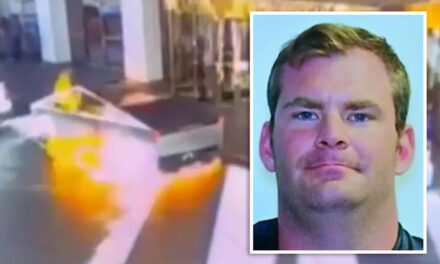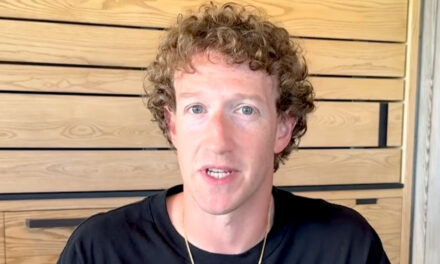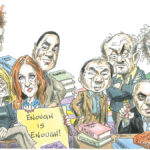
HORIST: We have to do SOMETHING. An open letter to David Hogg
David Hogg is a senior at Marjory Stoneman Douglas High School where 17 young people were murdered and many others seriously injured. Many of those who escaped the bullets will have to deal with lifelong post trauma syndrome. One does not see the reports on television without fighting back tears.
Douglas High School is only a few minutes drive from my home. At the time of the tragedy, a friend and I had just completed bowling and were enjoying lunch. As bullets were ending the promising lives of those young students, I was enjoying an Italian sausage sandwich and fries. We saw the first reports on the restaurant television scene, but there were no details – just that shots were fired. It was not until I arrived home that the gravity of the situation unfolded.
I was struck by an interview with a young student named David Hogg. His on-camera demeanor was very professional and articulate. In a morning interview, I learned that he was either a reporter or anchor for the school video news program.
Based on the interviews I witnessed, I feel safe to predict that David will become a national celebrity – well deserved — as a result of this terrible incident. If it is his ambition, I will also believe that he will have a future in broadcast television. I would not be surprised if the intern offers are not already lining up.
Like the professionals in the business, and all the interviewees who appeared on the screens, David passionately called for SOMETHING to be done. But why is that SOMETHING so difficult to determine and, more importantly, to do. That is the subject of my open letter to David Hogg.
Dear David,
No human heart can escape the pain of what happened to your school and your classmates. Sympathy and empathy cannot produce the full pain of those who were close to the tragedy – and especially those who lost loved ones. I can only relate in some measure by the loss of my Marine grandson in Afghanistan.
You, like others on television – and better than many – reflected the frustration and anger everyone feels. Like you, virtually every commentator confirmed that SOMETHING must be done, but could not articulate what that might be beyond general terms focusing on the ongoing national political debate over guns.
First, I should tell you, David, that I am not a member of the National Rifle Association and I am not a gun owner. You should also know that I have spent my life in the arena of public policy –policies based on facts and solutions.
Let me first talk about guns. It is an issue that tends to divide our nation on partisan and philosophic grounds. There are those who call for banning all ownership of personal guns. There are those who call for greater restrictions. Much that is impassioned rhetoric designed to energize the political base and gain political advantage.
One of the reasons, I believe, that we have not found solutions to his type of tragedy is that we are not sufficiently engaged in a serious dialogue. I believe we have misfocused our attention too much on the weapon and not on the culture and the mindset of the individuals who perpetrate such heinous crimes.
If we cannot find and address the root cause, the instrument of death becomes irrelevant. In Oklahoma, 168 people were killed and 680 injured by an individual with a bomb. Another three people died, and hundreds were injured, including 16 who lost limbs, in the 2013 bombing of the Boston Marathon. We have seen intentional mass killings perpetrated with trucks, chemicals and poisons.
There is no shortage of fatal means to kill great numbers of people. The key to doing SOMETHING is to find out what motivates them and figure out how to deal with it through the criminal justice system or psychiatric care.
Why so many of these insane acts of violence occur at schools is imponderable. I am old enough to recall when such random shooting occurred at post office facilities. There were so many that almost any workplace shooting was referred to as “going postal.” Perhaps it has become a “thing” for the mentally diminished because of all the publicity. Some shooters have left communications indicating a lust for notoriety.
There may be some areas in which gun ownership regulations can be tightened, but as a person who has studied this issue for years, I am dubious of the results. Some say doing anything is better than doing nothing. Not really. Doing something to gain a meaningless sense of accomplishment does not solve the problem.
Many immediately look to Congress to take action. But, what action? What action—what new laws — would have avoided the tragedy in Parkland or any such past and future events?
I am certainly not opposed to investigating what possible action can take place. I would be open to any new legislation that is more than political window dressing. I recently wrote in the Sun Sentinel of my support for a ban on bump stocks, for example. I favor harsher penalties for illegal gun possession.
Much of the co-called stricter gun legislation has proven to be a failure. In my hometown of Chicago, we had a total ban on guns at the same time we had one of the highest murder rates in the nation. To put things in perspective, more people are murdered every week or two in each of Chicago, Baltimore and New York than died in Parkland. Sadly, this rolling tragedy continues because most of the victims are minorities and garner little concern from the media or the political leaders in those cities.
Rather than myopically focusing on the guns, we need to place the greatest emphasis on the perpetrators – the criminals and the mentally ill. We should be able to agree that every person who is motivated to murder masses of innocent people is mentally deranged. We currently have laws that bar people with histories of mental illness from legally obtaining a gun.
Sometimes it is not the lack of law that is the problems, but the system. This was the case of the shooter in Sutherland Springs, Texas. He was able to obtain guns because the Navy failed to report his mental health issues. It was reported that the shooter in Parkland had a history of treated mental health issues. Why were these not reported?
Laws are not effective if they are not enforced. Many of the murders in Chicago are committed by people possessing illegal guns. Are we doing enough to get those guns out of the hands of dangerous people? I would say we are not. If a total ban like we had in Chicago cannot reduce gun deaths, then we know the problem lies elsewhere – enforcement and the state of mind of the perpetrators.
People who own guns or are concerned about excessive regulation are good caring people. They abhor such violence as much as anyone. I noticed that you stuck to the facts in your report, without condescending to the rancorous name-calling that does no services to seeking solutions. You are a good example to professionals who engage far too much in biased political confrontation over guns. That is the dialogue that distracts from finding real solutions to our uniquely American problem. Simple and simplistic proposals may have political gravitas, but they do not lead to real solutions. If we are to avoid repetitive and unproductive responses, as heartfelt as they may be, we must focus on the primary cause – not just the means.
Yes, America stands out among the nations with the greatest mass killings. We are often compared to nations with stricter gun laws and fewer mass shootings. But, it is also true that Switzerland does not suffer from mass killings even though there is almost a 100 percent ownership of guns. That points to cultural problems in the United States.
The most promising potential is to interdict and treat those who pose a potential threat. That was an option even in Parkland, but apparently the adults looked the other way.
Keep up the good work, David. My heart and prayers are with you and all those who have suffered so greatly in this terrible tragedy.

























Joe Gilbertson: where are you going with these threats? My free speech is facing intimidation, sometimes physical threats. Is this…
NOT BUSTED. You didn't have to say it. That is what I meant in the above post from me. But…
Just another ruse for taking jabs at Biden through alleged short comings of his. Ten days remaining in Biden's term…
I never said I WANT China to continue to own Panama. You made that up. First,I didn’t say it. Second.…
I absolutely do Not in any way, shape or manner fabricate ANYTHING you say. I do and will always tell…